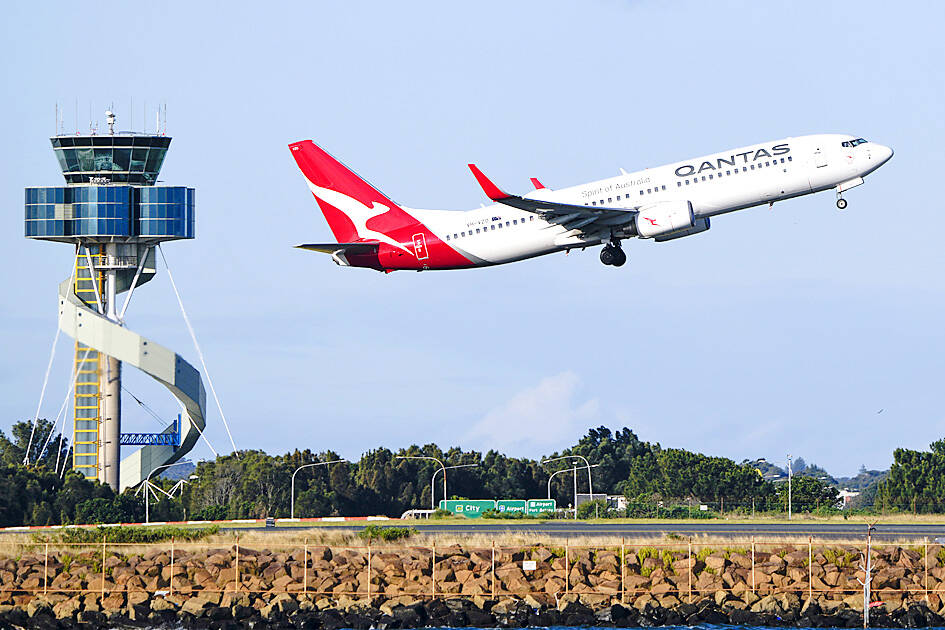Australia’s Qantas Airways Ltd agreed to pay A$120 million (US$79 million) to settle a regulator lawsuit over the sale of thousands of tickets on already canceled flights, in an attempt to end a reputational crisis that has engulfed the airline.
The company is to split A$20 million between more than 86,000 customers who booked tickets on the so-called “ghost flights” and pay an A$100 million fine instead of defending the lawsuit that it had previously vowed to fight, Qantas and the Australian Competition and Consumer Commission (ACCC) said on Monday.
The fine is the biggest ever for an Australian airline and among the largest globally in the sector, although some Australian banks and casino operators have faced higher penalties for breaches of the law.

Photo: AP
“We recognize Qantas let down customers and fell short of our own standards,” Qantas chief executive officer Vanessa Hudson said in a statement.
The settlement “means we can compensate affected customers much sooner than if the case had continued in the Federal Court,” Hudson said, who started her role in September last year, adding that the court still must sign off on the settlement.
If the court approves, the settlement would resolve a dispute that had featured prominently at a time when Qantas’s brand value tanked in consumer surveys amid a spike in complaints about cancellations. After the ACCC filed its lawsuit in August last year, Hudson’s long-serving predecessor, Alan Joyce, brought forward his retirement.
“This penalty ... will send a strong deterrence message to other companies,” ACCC Chair Gina Cass-Gottlieb said in a statement.
However, the payout would pale against the A$1.47 billion net profit that analysts on average forecast Qantas to report in the year to the end of June, London Stock Exchange Group data showed.
People who bought tickets on non-existent domestic flights would get A$225 and people with international fares would get A$450, on top of a refund, the airline and regulator said.
Qantas is still waiting to learn how much it must pay nearly 1,700 ground handling staff it sacked in 2020 after a court found the job cuts were illegal since they were intended to stop industrial action.
The ACCC lawsuit centered on the months after Australia’s border reopened in 2022 following two years of COVID-19 restrictions, and airline cancelations and lost luggage complaints spiked globally amid staffing shortages.
Qantas had said that it faced similar challenges to airlines around the world, but the ACCC said its actions broke consumer law, as it sometimes sold tickets to flights weeks after they were canceled.
Cass-Gottlieb said that the settlement included a promise from Qantas not to repeat the conduct.

MARKET LEADERSHIP: Investors are flocking to Nvidia, drawn by the company’s long-term fundamntals, dominant position in the AI sector, and pricing and margin power Two years after Nvidia Corp made history by becoming the first chipmaker to achieve a US$1 trillion market capitalization, an even more remarkable milestone is within its grasp: becoming the first company to reach US$4 trillion. After the emergence of China’s DeepSeek (深度求索) sent the stock plunging earlier this year and stoked concerns that outlays on artificial intelligence (AI) infrastructure were set to slow, Nvidia shares have rallied back to a record. The company’s biggest customers remain full steam ahead on spending, much of which is flowing to its computing systems. Microsoft Corp, Meta Platforms Inc, Amazon.com Inc and Alphabet Inc are

Luxury fashion powerhouse Prada SpA has acknowledged the ancient Indian roots of its new sandal design after the debut of the open-toe footwear sparked a furor among Indian artisans and politicians thousands of miles from the catwalk in Italy. Images from Prada’s fashion show in Milan last weekend showed models wearing leather sandals with a braided design that resembled handmade Kolhapuri slippers with designs dating back to the 12th century. A wave of criticism in the media and from lawmakers followed over the Italian brand’s lack of public acknowledgement of the Indian sandal design, which is named after a city in the

The US overtaking China as Taiwan’s top export destination could boost industrial development and wage growth, given the US is a high-income economy, an economist said yesterday. However, Taiwan still needs to diversify its export markets due to the unpredictability of US President Donald Trump’s administration, said Chiou Jiunn-rong (邱俊榮), an economics professor at National Central University. Taiwan’s exports soared to a record US$51.74 billion last month, driven by strong demand for artificial intelligence (AI) products and continued orders, with information and communication technology (ICT) and audio/video products leading all sectors. The US reclaimed its position as Taiwan’s top export market, accounting for

INVESTOR RESILIENCE? An analyst said that despite near-term pressures, foreign investors tend to view NT dollar strength as a positive signal for valuation multiples Morgan Stanley has flagged a potential 10 percent revenue decline for Taiwan’s tech hardware sector this year, as a sharp appreciation of the New Taiwan dollar begins to dent the earnings power of major exporters. In what appears to be the first such warning from a major foreign brokerage, the US investment bank said the currency’s strength — fueled by foreign capital inflows and expectations of US interest rate cuts — is compressing profit margins for manufacturers with heavy exposure to US dollar-denominated revenues. The local currency has surged about 10 percent against the greenback over the past quarter and yesterday breached